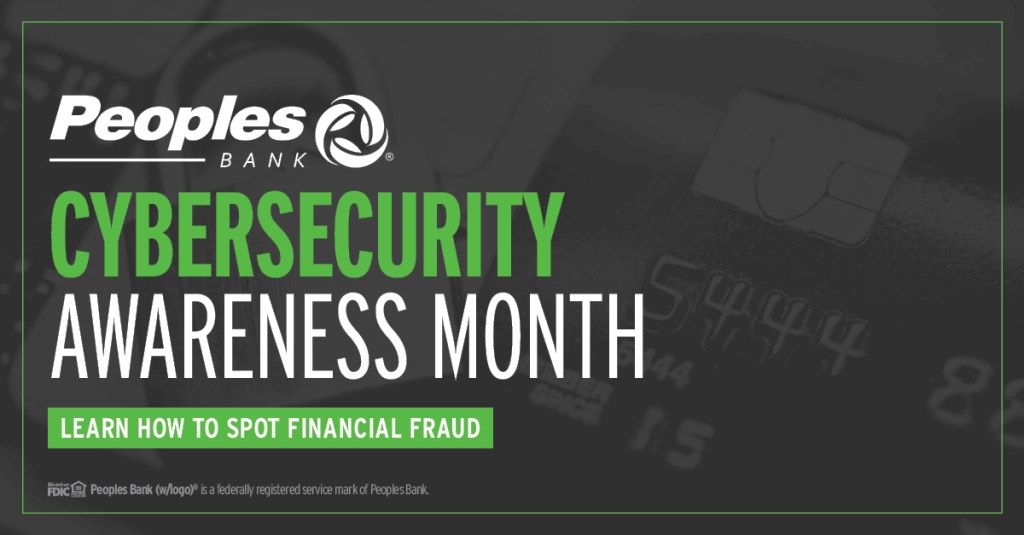October is Cybersecurity Awareness Month, an international initiative to help educate everyone about online safety and empower individuals and businesses to protect their data from cybercrime. Specific scams to defraud victims change over time. However, there are common themes and red flags that can help you identify a potential scam or financial fraud below.
Threat of harm scams
How it works:
- Initial Contact: Scammers reach out claiming to have access to you or someone in your family.
- Deceptive instructions: They claim that you or your family are in danger. You’re told if you don’t send money, you or your family member will be hurt.
- Impersonation: Scammers may use technology to impersonate your loved one’s voice to manipulate you and convince you to transfer funds.
Consider using a “safe word” that only you and your family members know, to validate the scenario and any request to authorize instant money transfers. Contact your bank to report the event, and law enforcement if you feel you are in immediate danger.
Tech support scams
How it works:
- Initial Contact: Scammers reach out, via computer pop-up, phone call, or text, claiming there is an issue with your device.
- Deceptive instructions: You are instructed to provide remote access to the device and to download an app to fix the issue.
- Access to personal information: Once you grant remote access or download the app, the scammer has access to your personal information. They can install malware on your device and demand payment before they give back your access.
No matter the reason given, be cautious about granting device access or downloading unfamiliar apps to fix issues with your devices. Run a full system virus and spyware scan and power off the device.
Investment Scams
How it works:
- Initial Contact: The scammer will reach out through social media, text or email with a unique investment opportunity or a chance to get rich quick.
- Deceptive instructions: You’ll be convinced to invest your money and will start to receive small returns.
- Fake returns: You’re then encouraged to invest larger sums of money based on the returns you are receiving but suddenly all communications stop.
Always validate investment opportunities. Use caution if asked to provide personal or financial information, especially if asked to send money through digital currency or instant money transfers.
Know the red flags that signal a scam
Scammers are constantly reinventing new ways to perpetrate old ploys. However, their tactics remain similar by targeting you through fake emails, text messages, voice calls, letters or even in person. No matter which technique the scammer uses, being aware of these red flags should make you pause:
You’re contacted out the blue:
- Contacted unexpectedly by phone, email, text, direct message or pop-up with a request for personal information or money. Peoples Bank will never text, email, call, or visit you at your home asking for personal or account information. Remember, never click a link or download an attachment from someone you don’t know.
You’re pressured to act immediately:
- Pressured to act immediately with an alarming phone call, email or text that plays with your emotions. Scammers may pose as an employee from a familiar organization and say there’s a problem that needs immediate attention. Do not act unless you have verified the person who has contacted you and the story or request is legitimate.
You’re asked to pay in unusual way:
- Asked to pay in an unusual way, like gift cards, bitcoin, prepaid debit cards or digital currency, including digital payment networks to resolve fraud. Peoples Bank will never ask you to transfer money to anyone, including yourself, and will never ask you to transfer money because we detected fraud on your account.
You’re asked to provide personal or account information:
- Asked to provide personal or account information, such as an account verification code, bank account number or PIN. When in doubt, don’t give it out. Peoples Bank will never text, email or call you asking for an account authorization code.
It seems too good to be true:
- Offered a free product or ‘get rich quick’ opportunity that seems too good to be true? If something sounds too good to be true, it probably is. Never cash a check for someone you don’t know.
Know the latest scam trends
Thieves are continually refining their methods, but you can help stay ahead of the scammers by checking trusted sources for updates and fraud trends:
- Federal Trade Commission (FTC) Consumer Advice
- FTC’s identitytheft.gov
- Federal Bureau of Investigation (FBI) Common Scams and Crimes
- Cybersecurity & Infrastructure Security Agency (CISA)
- Common Scams and Frauds on usa.gov
- Consumer Financial Protection Bureau’s fraud and scams information
You can also learn more about common cybersecurity scams in our recent blog, “5 Cybersecurity Scams to Watch for in 2024.”
If you’re concerned about your account or want help protecting yourself from fraudulent activity, Peoples Bank is always available to answer your questions. Contact the Customer Care Center at 800.374.6123 for assistance. You can also call or visit your local branch.


